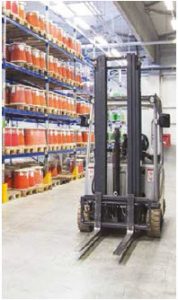
Moldova is a country in southeast Europe that borders the European Union with which it has increasing co-operation thanks, in part, to its proximity. Signed in 2014, an association agreement established a new legal framework for ensuring Moldova’s political association and economic integration with the EU, based on common values and close links. A full and effective implementation of the association agreement is largely viewed as the only path for securing Moldova’s future membership in the EU. Today, Moldova’s trade with the EU accounts for around 66 per cent of its
overall trade, which underlines the point that exported goods largely comply with EU norms and standards. Having shown steady economic growth of more than four per cent over the past two years, the Moldovan economy is the newest emerging investment destination. In fact, it ranked sixth in the 2017 IBM list of top-ranking countries by estimated jobs per million inhabitants. With a skilled and multilingual workforce and the lowest labour costs in the region, the most dynamic sectors of the Moldovan economy are automotive, agriculture and wine, manufacturing, textiles and apparel. In 2017, Moldova launched an IT park to foster more growth in its rapidly developing information and communications technology sector. The park offers IT companies a single uniform tax of seven per cent for investors. With some big investors already producing and outsourcing to the country, there is a large range of opportunities for companies seeking new production opportunities and investments. These are provided by the seven free economic zones and eight industrial parks that offer a variety of incentives, including a corporate tax of six per cent and total exemption from VAT and custom duties. As one of the fastest-growing industries in Moldova, the automotive sector boasts more than 12,500 jobs created so far and represents more than $400 million US in exports. At 20 per cent of total Moldovan exports, the automotive sector is increasingly attracting foreign investors. Overall, 15 companies from countries such as the United States, Germany, Japan, Austria and Italy invested in the automotive sector. Among the biggest manufacturers present today in Moldova are: German Dräxlmaier AG, which has three plants and approximately $75 million US in investments; the U.S.’s Lear Corporation, the fourth biggest exporter from Moldova; Austrian cable and wire manufacturer Gebauer& Griller, whose investments for the construction of its second recently opened factory in Moldova exceeded $23.8 million US with 600 new jobs; Japan’s Fujikura Automotive, with $3.8 million US in investments and more than 1,200 new jobs with a target of 3,000 jobs generated by 2020; Japanese-German Sumitomo Electric Bordnetze, which has $35.8 million US in investments, 500 employees and a target of 2,500 new jobs in the next few years. All of this investment adds to Moldova’s growing image as a reliable partner for businesses looking to expand and invest. According to the latest World Bank annual ratings, in 2017, Moldova ranked 44th among 190 economies in the ease of doing business. Also, trade with Canada has seen an upward tick over the last few years. Moldovan exports to Canada in 2017 accounted for about $4.8 million US (almost twice as much as in 2016), primarily thanks to wine products (which represented 57 per cent of the total Moldovan exports to Canada, or $2.8 million US.) Meanwhile, imports of Canadian products into the Moldovan market accounted for $6.3 million US, primarily based on chemical products, machinery and mechanical appliances and animal products. In 2017, about 60 Moldovan businesses exported their goods to the Canadian market, mainly in the agricultural sector, followed by textiles, apparel, footwear and leather goods, electrical equipment, machinery and furniture. Bordered by Romania to the west and Ukraine to the east — countries that already enjoy a free-trade regime with Canada — Moldova’s free movement of goods to the European market, its growing economic integration with the EU, as well as the recent signing, in Ottawa, of a foreign investment promotion and protection agreement with Canada, provide a solid basis for boosting bilateral trade and investments between our countries. Today, when the world is confronted with increasingly protectionist policies and growing trade barriers, Canada is rightfully looking to stretch its presence in Europe. With the CETA being implemented, it is time to gain the momentum and explore the potential of Europe’s emerging markets.
Ala Beleavschi is the ambassador of
Moldova. Reach her at ottawa@mfa.md or phone her at (613) 695-6167.




